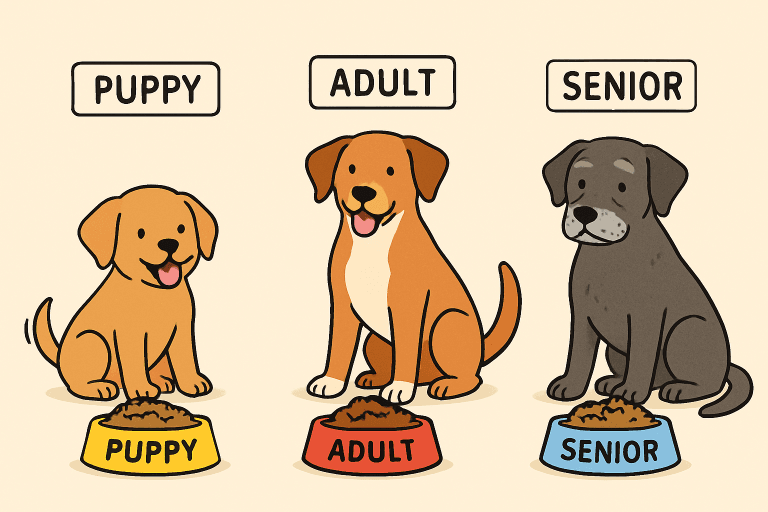business resources
How Quality Nutrition Impacts Every Stage of a Dog’s Life
24 Nov 2025, 4:45 pm GMT
Key Takeaways
- Tailored nutrition supports optimal health at every stage of life.
- A proper diet can help prevent common health issues and promote longevity.
- Understanding specific nutritional requirements helps in selecting appropriate dog food.
Ensuring your dog’s diet is tailored to meet their needs at every life stage is one of the most critical factors for their long-term health and happiness. Proper nutrition lays the groundwork for healthy development in puppies, supports adult dogs throughout their years of companionship, and helps senior dogs maintain their vitality. By choosing high-quality food and supplements, such as those found in this selection of canine products, you can help protect your dog from health issues and enhance their overall quality of life.
Nutritional needs change dramatically as dogs mature, so understanding what your dog requires at each phase ensures they receive optimal support. Whether you’re seeking to help your puppy build strong bones, keep your adult dog energized, or help your senior dog age comfortably, informed nutrition is essential. Minor adjustments over the years set the stage for fewer medical problems and a more vibrant life overall.
Puppyhood: Building a Strong Foundation
Puppies are a whirlwind of growth and curiosity, and their developmental needs are substantial. Specially formulated diets for puppies contain the right balance of high-quality animal proteins and precisely measured minerals, like calcium and phosphorus, to promote healthy bones and muscles. It’s especially critical to carefully manage these minerals in large-breed puppies, as rapid or uneven growth can lead to permanent skeletal problems.
Skimping on nutrition—or inadvertently overfeeding vitamins and minerals—can lead to orthopedic issues or a weakened immune system. As explained by veterinarians, starting dogs off with a foundation of robust nutrition gives them the best possible chance for a vibrant, active adult life.
Adulthood: Maintaining Optimal Health
When dogs reach adulthood, maintaining their health means balancing energy intake and output. Quality protein sources are essential for lifelong muscle support, while strategic fat content provides energy for activity and aids in nutrient absorption. Whole grains, potatoes, or legumes offer complex carbohydrates for steady energy, and dietary fiber ensures healthy digestion and stool quality.

Obesity is a growing concern among adult dogs, often resulting from overfeeding or insufficient exercise. Excess weight can increase the risks of diabetes, joint problems, and cardiac disease. By measuring meals and keeping treats in check, you can help your dog stay in top shape. Pet food packaging usually provides guidelines, but it’s essential to monitor your dog’s body condition and adjust as needed—something made easier with regular vet check-ups, as advised by the ASPCA.
Senior Years: Supporting Aging Bodies
As dogs grow older, their bodies require fewer calories but more targeted nutrition. Seniors often need food that’s lower in fat to counteract reduced activity and higher in digestible protein to preserve lean muscle. Fiber levels in senior diets are commonly increased, supporting gastrointestinal health as metabolism slows. Additionally, antioxidants such as vitamin E and beta-carotene are often added to help protect the brain from age-related decline.
Some senior dogs develop issues like arthritis, cognitive dysfunction, or kidney disease. Switching to a specialized diet or using veterinarian-recommended supplements can provide the necessary support. Your vet can recommend when and how to transition your dog to these new formulations, helping them remain lively and engaged during their golden years.
Special Considerations: Breed and Size
Every breed has its own unique challenges. Large breeds may need additional joint support and controlled calcium for optimal skeletal health, while toy breeds can benefit from energy-dense kibbles and smaller bite sizes. Breed-specific formulas exist to eliminate the guesswork in matching nutrition to physiological differences, thereby further maximizing your dog’s well-being.
The Role of Supplements
While a well-balanced diet covers most nutritional bases, some dogs may benefit from additions such as omega-3 fatty acids, joint-support supplements, or probiotics. For example, glucosamine and chondroitin can help alleviate stiffness in aging joints, while probiotics support digestion and immunity. However, all supplements should only be introduced alongside veterinary guidance to avoid unnecessary or unsafe overlap with regular nutrition.
Transitioning Between Life Stages
Moving from puppy food to adult formulas—or from adult to senior blends—should be done gradually. Making the switch over 7 to 10 days allows your dog’s digestive system to adapt, minimizing stomach upset and diarrhea. Start with a small proportion of new food and incrementally increase it each day until the transition is complete.
Consulting with Your Veterinarian
Annual or biannual exams are crucial for detecting any early signs of disease or nutritional deficiencies. Your vet can suggest routine blood work or weight checks, spot changes in your dog’s needs, and recommend updated dietary plans. These check-ups ensure your dog’s nutrition evolves alongside their life stage and health status, helping them remain a cherished part of your family for years to come.
Understanding and implementing life stage-specific nutrition empowers you to meet your dog’s unique needs at every phase. Through balanced food choices, supplements when appropriate, and guidance from your veterinary team, you can support a long, joyful journey together.
Share this
Shikha Negi
Content Contributor
Shikha Negi is a Content Writer at ztudium with expertise in writing and proofreading content. Having created more than 500 articles encompassing a diverse range of educational topics, from breaking news to in-depth analysis and long-form content, Shikha has a deep understanding of emerging trends in business, technology (including AI, blockchain, and the metaverse), and societal shifts, As the author at Sarvgyan News, Shikha has demonstrated expertise in crafting engaging and informative content tailored for various audiences, including students, educators, and professionals.
previous
How AI LandingPage Turns Ideas into Fully Functional AI Sites
next
Cities in California Leading the Way in Quantum Computing